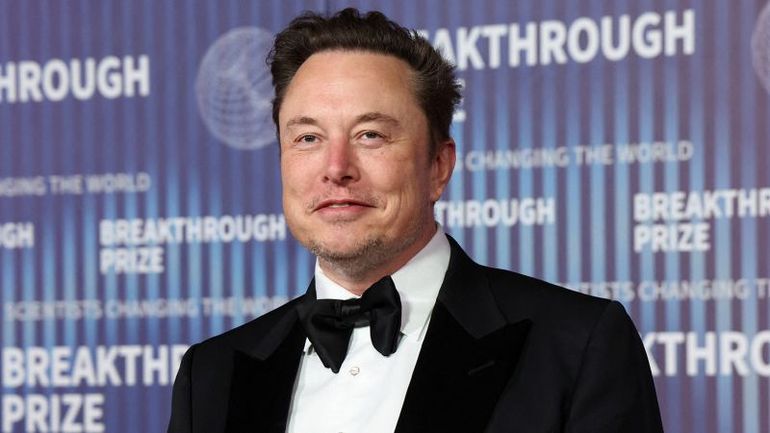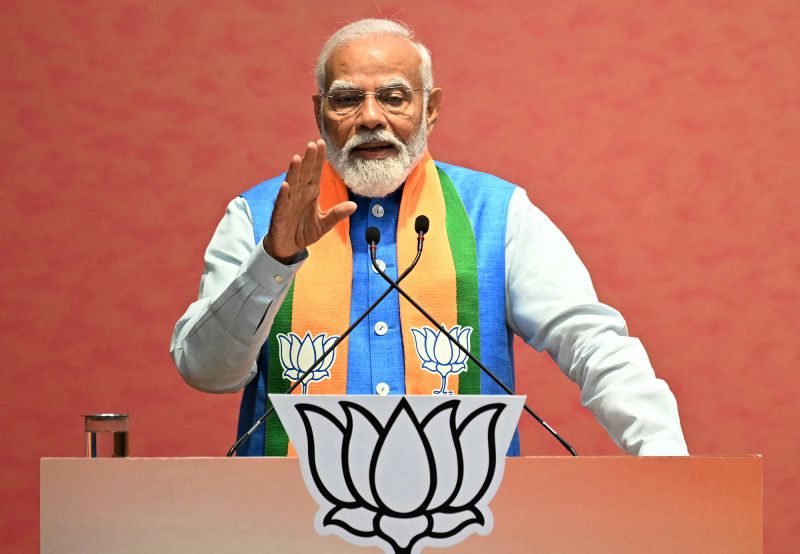
Tesla is on the brink of tapping into a huge new market. CEO Elon Musk will be visiting India next week, where he is scheduled to meet with Prime Minister Narendra Modi. During his visit, it is anticipated that Tesla will announce its plans to establish a factory in the country with the highest population in the world.
Elon Musk recently shared on social media that he is excited about the upcoming meeting with Prime Minister Modi. Although no specific date was mentioned, reports from Indian media and Reuters suggest that the meeting will take place in New Delhi next week.
During his visit, Musk also has plans to connect with space technology startups in India. Pawan Chandana, co-founder of Skyroot Aerospace, the company behind India's first privately developed rocket launched in 2022, shared with CNN that he is scheduled to meet with Musk on Monday. In addition to leading Tesla (TSLA), Musk is also the head of SpaceX, a rocket company, and X, previously known as Twitter.
Elon Musk, currently the world's fourth richest man, is reportedly planning to invest $2 billion to $3 billion in India. This investment will mainly be used for the construction of a new Tesla factory, as reported by Reuters and Financial Times, citing anonymous sources.
A meeting between Musk and Indian Prime Minister Narendra Modi is scheduled for next week. This meeting comes shortly after India started the world's largest democratic election, with an estimated 960 million eligible voters out of the country's 1.4 billion population. The polls began on Friday and will continue for over a month, with Modi expected to secure a rare third consecutive five-year term as prime minister.
Modi's Bharatiya Janata Party (BJP) highlighted the significant progress made in the manufacturing sector over the last decade in their election manifesto this week.
In 2019, Tesla established its first Asian factory in Shanghai, where it currently manufactures hundreds of thousands of cars for the Chinese market and for export. If Tesla decides to invest in India, it would greatly support Modi's goal of positioning India as a leading global manufacturing hub.
Narendra Modi speaks after releasing the Bharatiya Janata Party's (BJP) manifesto in New Delhi on April 14, 2024.
Narendra Modi speaks after releasing the Bharatiya Janata Party's (BJP) manifesto in New Delhi on April 14, 2024.
Bharat, the Sanskrit or Hindi name for India, is set to become a trusted global manufacturing hub. This will be achieved through various initiatives such as simplifying regulatory processes, investing in infrastructure, bringing capital to the industry, and focusing on research and development.
The Modi government is making a strong effort to take advantage of the changing mindset among global companies regarding their supply chains.
Executives are looking to expand their operations outside of China due to challenges faced during the pandemic and concerns about increasing tensions between Beijing and Washington. As a result, major companies like Apple supplier Foxconn are significantly increasing their presence in India.
Modi's party is not only focused on consumer electronics but also aims to boost manufacturing in sectors like semiconductors and electric vehicles (EV).
In their manifesto, it was stated, "We are committed to aiding the expansion of the automobile industry and its shift towards EV production. Our plan includes investment in setting up a widespread EV charging network to promote the use of electric vehicles nationwide."
A ‘natural progression’ for Tesla
Tesla’s entry into the world’s fastest growing major economy would be a win for Musk as well.
Even though electric vehicles (EVs) make up less than 1% of total vehicle sales in India, the country is expected to become an appealing market for Tesla in the future. Tesla is facing declining interest in major markets.
In the United States, electric vehicle sales have plateaued in recent months. China, which is the largest EV market globally, is also experiencing a slowdown due to market saturation and a decelerating economy.
Earlier this month, reports revealed that Tesla is reducing its global staff by more than 10% to save costs and improve productivity.
This decision follows a decline in sales compared to the same period last year during the first three months of this year, marking the first drop since the peak of the pandemic four years ago.
In the fourth quarter of 2023, Tesla briefly lost its position as the top seller of electric vehicles worldwide to Chinese automaker BYD. However, Tesla regained its lead in EV sales from BYD in the first quarter, even though there was a decrease in sales.
Tesla made a swift recovery in reclaiming its title as the leader in global EV sales, showing that they are determined to bounce back "as soon as humanly possible."
India is aiming to have 30% of all private car sales be electric by 2030, even as demand for EVs has decreased in other countries.
Elon Musk expressed his company's interest in investing in India "as soon as humanly possible" after meeting with Prime Minister Modi in New York last year.
The billionaire recently restated his goal of expanding into the South Asian nation. During an interview on X Spaces livestream, he mentioned that it is a "natural step to introduce Tesla electric vehicles in India."
Musk has been planning to enter the Indian market for a long time.
In 2017, Tesla's CEO mentioned the company's intention to start selling cars in India during that summer. However, the plan faced a delay due to negotiations with the Indian government to reduce import duties.
Fast forward to 2021, Elon Musk tweeted about Tesla's interest in entering the Indian market. He highlighted the challenge of high import duties, which he described as the highest among large countries worldwide.
Tesla wanted to reduce duties, but the Indian government insisted that they produce cars locally first before getting any tax breaks. Now, the Modi government has removed some barriers to encourage Tesla and other companies to manufacture electric vehicles in India.
Last month, a new policy was introduced in India to reduce taxes on certain electric vehicles produced by international car companies. This tax break is granted to manufacturers who invest a minimum of $500 million in the country and establish a local manufacturing plant.
Tesla, the electric car company, is not only focusing on India. It is also currently negotiating with the Thai government to construct a manufacturing plant in Thailand.
Tesla did not respond to a request for comment.
CNN’s Kunal Sehgal and Clare Duffy contributed to this report.
Editor's P/S:
Tesla's impending entry into the Indian market, as outlined in the article, presents a significant opportunity for the company and India. India, with its vast population and growing demand for electric vehicles, offers a promising market for Tesla's expansion. The Indian government's recent policy changes, including reduced taxes for EV manufacturers who invest in local production, have made India an even more attractive destination for Tesla.
Moreover, Tesla's investment in India would align with Prime Minister Modi's vision of positioning India as a global manufacturing hub. It would not only boost the country's economy but also contribute to its efforts to reduce carbon emissions and promote sustainable transportation. Tesla's entry into India is a positive development for both the company and the country, and it is expected to have a significant impact on the Indian automotive industry and the global EV market.














